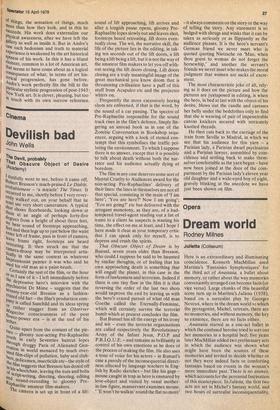Opera
Dream world
Rodney Milnes
Juliette (Coliseum) Here is an extraordinary and illuminating coincidence. Kenneth MacMillan used Martinu's 'Fantaisies Symphoniques' for the third act of Anastasia, a ballet about memory, or rather about the way memories conveniently arranged can become facts (or vice versa). Large chunks of this beautiful score turn up in Martinu's Julietta (1938), based on a surrealist play by Georges Neveux, where in the dream world to which the protagonist, Michel, retreats, there are no memories, and without memory, the key to existence, there are no facts either.
Anastasia started as a one-act ballet in which the confused heroine tried to sort out her memories in a hospital bed; five years later MacMillan added two preliminary acts in which the audience was shown what might have been the sources of these memories and invited to decide whether or not they were indeed facts or comforting fantasies based on events in the woman's more immediate past. There is no answer, which accounts for the perennial fascination of this masterpiece. In Julietta, the first two acts are set in Michel's fantasy world, and two hours of surrealist inconsequentiality, however winsomely contrived (and some of the episodes are hilariously funny) can be wearing; in the third, more menacing act, we see Michel in the Central Office of Dreams, just one of many seekers after escape from reality. We already know where he will escape to, but we are not shown clearly at least not at a first viewing — what it is he needs to escape from. This lack of dramatic conflict, to put it crudely, or context, seems the only drawback in an opera that deals with a very serious problem, but perhaps its creators would not think this relevant, If a programme note by one J.J. Bradley, FRCP, FRC.Psych., DPM — one calculated to send everyone screaming for sanctuary in the school of Szasz — is to be believed, we are here concerned with the essence of psychosis. Letters, incidentally, are catching: another programme note is signed `Dr Brian Large' though we are not told what it is, apart from opera on television, that he doctors, These reservations aside, J ulietta makes for a most absorbing evening in the New Opera Company's production. The score is technically brilliant. It moves forward briskly, with passages of dialogue, tifeltidram and dry recitative to help the pace, is spiced with good erotic tunes and some mid-century chunter at times reminiscent of Weill (who was originally to have set the play), and is most skilfully orchestrated: the textures are luscious and piquant, yet you can hear and hang upon every word of Dr Large's translation, at least you can when you are lucky enough to have Charles Mackerras in the pit.
Anthony Besch's clear production is another great asset,. and he is given every possible assistance by a large and uniformly excellent cast. Stuart Kale sustains the long and arduous role of Michel without once making an ugly sound; perhaps there is a corresponding lack of vocal brilliance but that, bearing in mind all those strangulated Central European tenors, is something up with which I will gladly put. In the title-role, Joy Roberts is almost absurdly beautiful, and as the repository of everyone's fantasies she has to be. She also has a soprano voice of bell-like purity, effortlesi projection and complete security. The countless supporting roles are faultlessly filled by that endless supply of singing-actors from the ENO: Sandra Dugdale as a legless Arab boy who promptly runs across the stage, as a moustachioed masher wandering through the forest in search of a party, or as the bell-hop dreaming of joining Buffalo Bill; Sarah Walker as the Gypsy who foretells the past; John Winfield as the gendarme who turns into the postman delivering three-year-old letters ('but that's not possible,' says Michel — oh no?); Edward Byles as the fairly civil servant doling out the opium of fantasy; Denis Wicks as the convict whose idea of heaven is the Galerie des Glaces with a barred window that swings open; and many more. Here be untold riches. John Stoddart's elegant and evocative decor is mostly in shades of grey, cer tainly appropriate to the Office of Dreams, and perhaps to the world of dreams as well. 1 suppose some people's fantasies arc more highly coloured. Mine jolly well are.



































 Previous page
Previous page